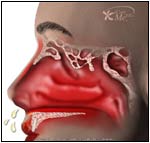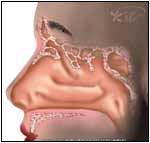
ABNORMAL

NORMAL
ALSO KNOWN AS
Hay fever
DESCRIPTION
* Inhaled allergens (materials that are foreign to the body) such as pollens, molds, or dust trigger an abnormal response by the body's immune system (protective cells and Proteins known as antibodies that attack foreign invaders), specifically, allergins trigger IgE antibodies, which attach to mast cells. Mast Cells are specialized cells that release inflammatory products. These inflammatory products produce the symptoms that occur with allergic rhinitis. Symptoms occur seasonally or year-round, depending on the allergen.
SYMPTOMS
* Nasal Congestion
* Sneezing
* Watery eyes
* Eye irritation
* Eye itching
* Headaches
* Pressure in the cheeks
* Wheezing
* Impaired sense of smell
* Sore throat and coughing may occur
CAUSE
* Pollens
* House dust
* Dust mites
* Mold spores
* Grasses
* Ragweed
* Animal products -- urine, saliva, hair, skin debris
HOW THE DIAGNOSIS IS MADE
* Possible findings on examination:
1. Swollen and pale or purple turbinates (inside the nasal cavity)
2. nasal polyps
3. Tenderness above eyes near bridge of nose or over cheeks.
4. Wheezing in chest
* Tests:
1. Complete blood count
2. Skin allergy testing
3. Serum RAST testing
TREATMENT
* Avoidance of allergen is best:
1. If you are suffering from an environmental allergen -- stay indoors, use air conditioners or air filters.
2. If caused by animals, keep pets out of bedroom or remove animal from the home.
3. If caused by mold spores, keep bathroom areas clean of mold and repair all leaks.
4. Use flooring in place of carpets, dust frequently, and using dust-proof material, furniture, and bedding can reduce house dust/house mites.
* Medications:
1. Antihistamines -- over the counter such as Benadryl are effective, but tend to cause drowsiness. Newer prescription medications such as Claritin and Allegra are less likely to cause drowsiness, but are more expensive.
2. Nasal corticosteroid sprays
3. Cromolyn Sodium nasal sprays
4. Antihistamine nasal sprays
5. Decongestants such as Pseudoephedrine
6. Ibuprofen may help with associated headaches.
7. Prednisone in a tapered dose
8. Medrol dose pack
9. Kenalog (Triamcinolone injection) -- corticosteroid injection gives 4-6 weeks of relief, but can have long term side effects if given too frequently
* Desensitization therapy also known as "Allergy Shots" -- very small amounts of allergen are injected, slowly increasing the dose over time in order to desensitize the body.
SIMILAR CONDITIONS
* Acute Sinusitis
* Chronic Sinusitis
* Common Cold
* Asthma
* Contact Dermatitis
* Allergic eye disease
0 ulasan:
Post a Comment